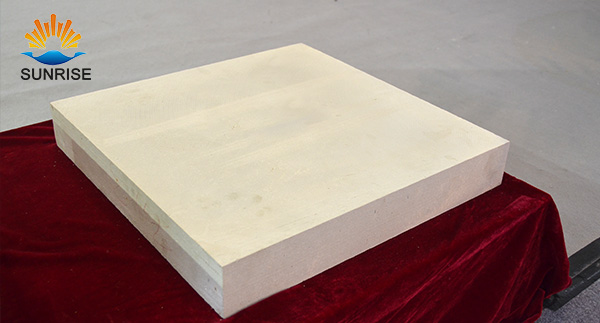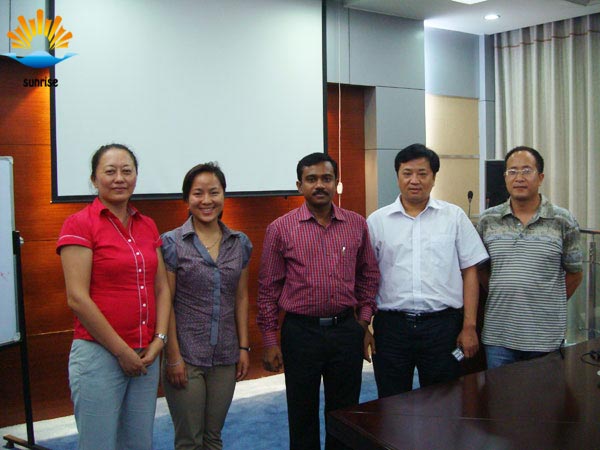
Product List
Success Case
Contact Us
- 0086 371 63838939
- 0086 371 63835539
- sales@sunriserefr.com
- tkfanyi
- No.36 Fengchan Road, Zhengzhou City

News
Exudation Temperature of Glass Phase of Fused Cast Refractories
- More related products
- Fused Cast AZS
- Fused Cast Alumina Block
- Fused Cast High Zirconia Block
- Fused Cast Skid Rail Block
Exudation temperature of glass phase is an important indicator to measure the exudation ability of fused cast refractories. It has great effect on the corrosion resistance of the fused cast refractories and quality of glass.

Exudation temperature of glass phase is usually measured with the increasing temperature method by measuring the temperature at which the liquid starts exudation and the droplet is formed with the high temperature microscope. In actual production,
The exudation ability of fused cast refractories can be generally divided into five grades:
1) 0 grade: no liquid exudation;
2) 1 grade: little or no exudation of droplets less than 3 mm;
3) 2 grade: the exudation of 5 mm droplets is visible;
4) 3 grade: a large number of droplets more than 5 mm are exuded;
5) 4 grade: the surface of the sample is covered with glass film.
The above grades can generally help determine the exudation ability of glass phase of the fused cast refractories. For example, at 1450℃, the fused cast refractories made by the oxidizing method belong to 0-1 grade, while those made by the reducing method belong to 3-4 grade.
Factors that influence the exudation temperature of fused cast refractories include the chemical composition of the fuse cast refractories and the ingredients of the glass phase.
The chemical composition of the fused cast refractories is an important factor that influences the amount of glass phase. ZrO2 in the fused cast AZS is introduced by zirconite (ZrO2&SiO2). Zirconite contains impurities such as TiO2, Al2O3, Fe2O3, CaO and MgO. The higher the content of the impurities is, the higher the amount of glass phase is, the easier to exude the glass phase is. Besides, in order to decrease the melting temperature and power consumption, solvents such as soda ash and borax are added during the meting process. The higher the amount of solvents is, the higher the amount of glass phase is, the easier to exude the glass phase at high temperature is. Fused cast alumina block contains fewer impurities and Na2O enters the solid phase. It has less liquid phase, thus the exudation of the liquid phase is less too.
The ingredients of glass phase is another important factor that influences the exudation temperature of glass phase. When the glass phase contains fusible components such as K2O, Na2O and B2O3, they can decrease the melting temperature and viscosity of the glass phase and promote the exudation of liquid phase. When variable valence metal oxides such as TiO2 and Fe2O3 exist in lower valence states, the liquefying temperature and exudation temperature drop. When Al2O3 and ZrO2 enter the liquid phase, they can also promote the exudation of the liquid phase.
At high temperature, the exudation of liquid phase can cause holes in the refractories and the glass liquid diffuses into the refractories and accelerates the corrosion. The liquid phase exuded into the molten glass can result in glass defects such as bubbles, stones, stripes and nodules.
- Read more
- Practical Application and Abrasion Resistance of Refractory Materials
- Fused Cast AZS 33 Brick With Good Dense Structure For Glass Furnace
- Fused Cast AZS 36 Brick With High Corrosion Resistance To Glass Liquid
- Long Service Life Brick-Fused Cast AZS 41 Brick With Almost No Shrinkage Cavities
- Fused Cast Alpha-Beta Alumina Brick Which Can Minimize Contamination To Glass Liquid
Leave Message
For more information on any of our products please get in touch using the form below. One of our sales team will respond to your enquiry as soon as possible.

Copyright © 2014 Zhengzhou Sunrise Refractory Co., Ltd. 豫ICP备13002126号












